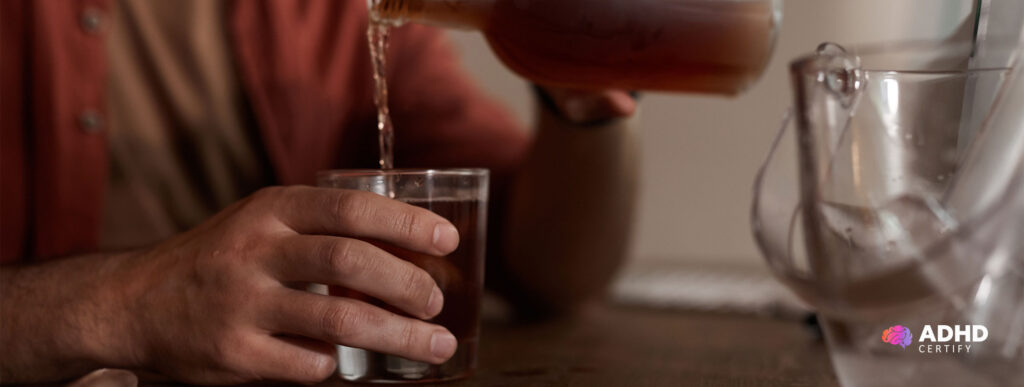Many adults with ADHD struggle not only with attention but also with related challenges such as alcohol and drug misuse.
According to the Adult substance misuse treatment statistics 2023 to 2024 report, published by the Department of Health and Social Care on 28 November 2024:
More than 310,000 adults in England accessed treatment for issues related to drug addiction and ADHD or alcohol use in just one year.
These findings highlight how ADHD and alcohol, as well as broader drug misuse, are significant problems for neurodivergent communities. This real-world impact underscores the need for accurate, trusted support.
Understanding how ADHD and alcohol interconnect with drug addiction and ADHD can help people find safer, evidence-based pathways forward.
ADHD and Alcohol: Understanding the Connection
ADHD and alcohol misuse are closely linked by both neurobiology and behaviour.
Impulsivity and differences in dopamine pathways, which are well-documented traits of ADHD, make it harder for many people to regulate cravings or avoid risky drinking patterns. This is a recognised concern across UK health guidance and clinical reports. These same traits raise the risk for drug addiction and ADHD occurring together in people needing treatment.
National UK government data show that alcohol and drug misuse remain leading reasons adults seek support from NHS addiction services, and the majority of adults in treatment also have an identified mental health need, which can include ADHD.
Why alcohol and ADHD are a risky mix
Alcohol can worsen issues with organisation, judgement, emotional control, and self-regulation; executive difficulties that are core to ADHD.
When alcohol and ADHD combine, everyday routines and wellbeing are even harder to maintain. This increases the risks of dependence, relapse, and further mental health challenges.
Drug Addiction and ADHD, Patterns and Risk
Drug addiction is defined as a chronic, relapsing disorder marked by compulsive drug seeking and use despite harmful consequences.
People living with ADHD and drug use face distinct challenges:
- UK treatment services report complex cases involving stimulants, cannabis, or other illicit substances as well as alcohol, requiring tailored intervention.
ADHD and alcohol misuse often run alongside other substance use, making diagnosis and support more complex.paste.txt
There is clear evidence that ADHD is associated with a higher risk of substance use disorder than the general population, a link consistently emphasised in UK government and clinical guidance.
ADHD and drug use patterns often develop from early experimentation, impulsivity, and difficulties with reward processing. Many neurodivergent adults turn to drugs or alcohol for self-medication, seeking relief from distress, inattentiveness, or hyperactivity.
For some, this leads to dependency and long-term health risks while others, with the right support, learn safer coping strategies.
ADHD Drugs and Alcohol: Interactions and Dangers
Mixing ADHD medication with alcohol is particularly risky.
This combination can increase the chances of accidental overdose, cardiovascular issues, and worsen existing symptoms like impulsivity or poor judgement.
NHS guidance is clear, never combine ADHD drugs and alcohol without direct medical advice or supervision.
This is crucial for adults managing both ADHD treatment and alcohol use, as even moderate drinking can interact with prescribed medication in unpredictable ways.
Signs, Risks, and Long-Term Effects
ADHD and alcohol misuse, as well as drug addiction and ADHD, often show up as escalating use, stronger cravings, and withdrawal symptoms when someone tries to cut back. People may notice their mental and physical health suffering, work and relationships declining, or routines breaking down. These are all significant warning signs that a pattern of substance use is developing into a real problem.
The consequences can be serious.
- Drug addiction and ADHD are linked to a higher risk of suicide, ongoing depression, and even involvement with the criminal justice system if left unaddressed.
- Alcohol and ADHD together may also increase the chance of job loss or financial strain due to impulsive decisions and difficulties managing daily life.
Economic harms and social exclusion are more likely when these two issues intersect, underscoring the importance of timely recognition and care.
Evidence-Based Support and Safer Coping
Finding practical, evidence-based support for ADHD and alcohol, or drug addiction and ADHD, can make a meaningful difference in recovery.
- Cognitive Behavioural Therapy (CBT), peer support, and NHS specialist services for adults with ADHD and addiction are available throughout the UK. These approaches offer strategies to help change thinking patterns, develop skills for self-control, and connect people with others who understand the complexities of ADHD and alcohol use.
- Harm reduction focuses on honest conversations, safer substance use, and gradual change rather than perfection. This can include step-down approaches, safer social environments, or alternative coping strategies such as mindfulness and structured routines.
- Medication management is another essential element: reviewing prescriptions with a GP ensures safe ADHD medication use and avoids dangerous interactions with alcohol or other drugs.
Above all, the path to recovery involves self-compassion and realistic expectations. Empowerment means understanding your risk factors, seeking help early, and being supported by specialist ADHD and addiction teams.
Internal resources can also be useful, consider drug addiction and ADHD therapy, harm reduction strategies, and guides for safe ADHD medication use when building your support network.
When to Seek Help?
Knowing when to reach out for support with ADHD and alcohol, or drug addiction and ADHD, is essential for long-term wellbeing.
Key signs include;
- Escalating use
- Frequent cravings
- Failed attempts to stop
- Withdrawal symptoms
- Persistent impacts on health, relationships, or employment
It’s also wise to seek help if you feel overwhelmed, lose control, or notice mental health worsening alongside substance use.
In the UK, professional pathways include NHS adult ADHD teams, local drug and alcohol services, and national helplines such as FRANK or Turning Point.
Charities offer additional therapy, peer groups, and practical support. Many clinics like ADHD Certify, provide confidential and same week initial assessments, aftercare like from Therachange, and links to harm reduction strategies; all tailored to support people managing ADHD and addiction together.
Conclusion: Breaking the ADHD and Alcohol Cycle
Overcoming drug addiction and ADHD, as well as persistent struggles with ADHD and alcohol, is within reach when expert help is available. Early recognition, honest communication, and evidence-based care allow people with ADHD to make safer choices and reclaim control in daily life.
If substance use is related to ongoing symptoms or uncertainty, a professional assessment can clarify your needs and unlock access to targeted support. Consider booking an adult ADHD assessment to explore tailored strategies, or a children ADHD assessment to support young people and families.
Every step forward matters; whatever your journey, compassionate help and practical tools make lasting change possible.
Let the right foundation be your starting point.
Frequently Asked Questions
What support is available for dual diagnosis in the UK?
Specialist NHS services, charities, and some private clinics now offer integrated assessment and treatment for ADHD alongside addiction support. Many areas have designated dual diagnosis teams able to provide tailored therapy, medication reviews, and harm reduction advice.
Which therapies help ADHD and alcohol issues?
Cognitive Behavioural Therapy (CBT), addiction counselling, and group-based peer support are all clinically supported for people navigating ADHD and alcohol or drug challenges. Combining therapies and involving family or carers can increase success rates.
Are harm reduction and abstinence both valid?
Yes, both approaches are accepted in the UK. Harm reduction aims to make substance use safer, offering support for gradual change, while abstinence focuses on complete cessation. People with ADHD can benefit from either route, what matters is that support is person-centred and non-judgemental.

Adam Carter
Author
Adam Carter is a neurodiversity advocate and experienced content writer for ADHD Certify. With a professional background in education and over a decade of personal experience living with ADHD, Adam writes with deep empathy and insight. He is passionate about creating content that resonates with others on similar journeys, offering clarity, encouragement, and hope. In his spare time, Adam enjoys cycling, gardening, and experimenting with new recipes in the kitchen.
All qualifications and professional experience mentioned above are genuine and verified by our editorial team. To respect the author's privacy, a pseudonym and image likeness are used.




